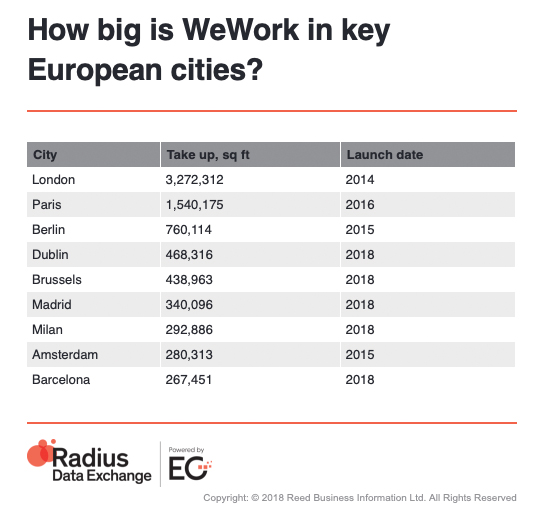WeWork is eyeing space in some of Dublin’s most striking new office developments as part of a rapid expansion in the city – even as agents warn that landlords’ willingness to have the loss-making flexible space provider as a tenant could diminish ahead of its expected stock market float.
Since WeWork opened its first space in Dublin only last year, the firm has grown to have close to 470,000 sq ft across its portfolio in the city, according to analysis by BNP Paribas Real Estate. That makes Dublin the company’s largest market in Europe behind Berlin, where it has more than 760,000 sq ft, Paris (1.5m sq ft), and London (3.3m sq ft).

Now the company is understood to have shown interest in space including Park Developments’ The Reflector, and Tristan Capital Partners’ Exo.
The Reflector, one of Dublin’s iconic new office blocks in the Grand Canal Dock area, has roughly 8,000 sq ft of office space still available to let. The rest of the 121,089 sq ft six-storey office is let to tenants including Airbnb, and Boston-based tech firm LogMeIn.
Efforts to lease the remaining space come as Park Developments seeks to sell the building. EG revealed in June that German fund Wealthcore Group is in talks to buy The Reflector for around €160m (£142m), over the original asking price of €155m.
Meanwhile, the 169,000 sq ft Exo office development is set to be Dublin’s tallest office building, at 73m. Tristan Capital bought the site in Dublin’s North Docks for around €80m in January last year from Ireland’s National Asset Management Agency.
Questions about WeWork’s business model and finances continue to be raised, as the company gears up for an initial public offering that could reportedly take place as early as September.
Some landlords are wary of WeWork’s use of special-purpose vehicles to hold individual leases. Some are worried that, in a worst-case scenario, the company could have the option to fold those SPVs if there is an economic downturn, or after rent-free periods come to an end.
A property market source in Dublin said local landlords may try to keep their options open in the hunt for “a rock-solid covenant”, rather than “jump in now” with a flexible office space provider.
Nonetheless, a WeWork tenancy is still an attractive option for some asset owners, if the covenant risk is mitigated by financial compensation or other incentives.
Savills Investment Management recently acted alongside Korea’s Vestas Investment Management, to buy the 121,270 sq ft Charlemont Exchange in Dublin from Marlet for around €145m. The deal followed the pair’s acquisition in December of 125 Shaftesbury Avenue (190,000 sq ft) from Almacantar for £267m. Both buildings are subject to a 20-year lease to WeWork, with the former sublet to Amazon for three years and the latter sublet to Facebook for at least two years.
It is understood that Vestas-Savills IM bought the building at a yield of 4.7%, which is roughly 30 basis points higher than the average office prime central office yield in Dublin in Q4 2018, according to BNP Paribas.
Savills IM’s acting chief executive, Kiran Patel, said: “There is a covenant issue, but you have to embrace the new world.
“WeWork is not making money, but Amazon didn’t make money for 19 years since it was launched and investors stuck with it. However, if you do have a WeWork covenant you want some form of discount in the pricing.”
Other landlords to have let out space to WeWork in Dublin include Irish property groups McGarrell Reilly and Ballymore. The former handed WeWork its first office in Dublin, 56,000 sq ft at Iveagh Court, while the latter let 99,500 sq ft to WeWork at its No2 Dublin Landings scheme.
WeWork declined to comment. Tristan Capital Partners and Park Developments did not respond to requests for comment.
To send feedback, e-mail anna.ward@egi.co.uk or tweet @annaroxelana or @estatesgazette











